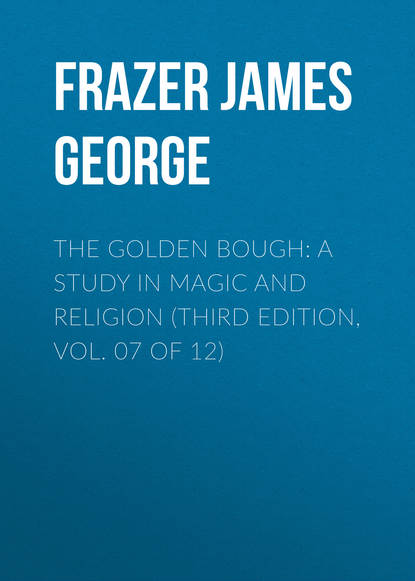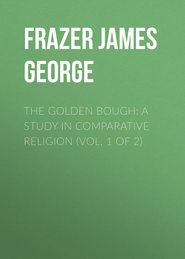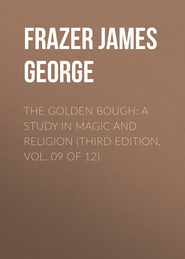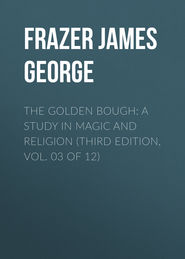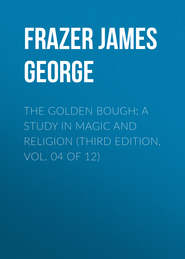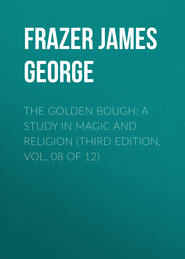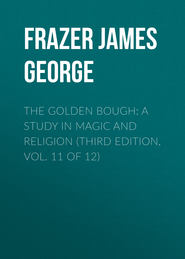По всем вопросам обращайтесь на: info@litportal.ru
(©) 2003-2024.
✖
The Golden Bough: A Study in Magic and Religion (Third Edition, Vol. 07 of 12)
Настройки чтения
Размер шрифта
Высота строк
Поля
487
Th. Vernaleken, Mythen und Bräuche des Volkes in Oesterreich (Vienna, 1859), p. 310.
488
Hutchinson, History of Northumberland, ii. ad finem, 17, quoted by J. Brand, Popular Antiquities of Great Britain, ii. 20, Bohn's edition.
489
E. D. Clarke, Travels in Various Countries of Europe, Asia, and Africa, Part ii., Section First, Second Edition (London, 1813), p. 229. Perhaps Morgay (which Clarke absurdly explains as μητὴρ γῆ) is a mistake for Hawkie or Hockey. The waggon in which the last corn was brought from the harvest field was called the hockey cart or hock cart. In a poem called “The Hock-cart or Harvest Home” Herrick has described the joyous return of the laden cart drawn by horses swathed in white sheets and attended by a merry crowd, some of whom kissed or stroked the sheaves, while others pranked them with oak leaves. See further J. Brand, Popular Antiquities, ii. 22 sq., Bohn's edition. The name Hockey or Hawkie is no doubt the same with the German hokelmei, hörkelmei, or harkelmei, which in Westphalia is applied to a green bush or tree set up in the field at the end of harvest and brought home in the last waggon-load; the man who carries it into the farmhouse is sometimes drenched with water. See A. Kuhn, Sagen, Gebräuche und Märchen aus Westfalen (Leipsic, 1859), ii. 178-180, §§ 494-497. The word is thought to be derived from the Low German hokk (plural hokken), “a heap of sheaves.” See Joseph Wright, English Dialect Dictionary, iii. (London, 1902) p. 190, s. v. “Hockey,” from which it appears that in England the word has been in use in Yorkshire, Cambridgeshire, and Suffolk.
490
Book ix. lines 838-842.
491
W. Mannhardt, Mythologische Forschungen, pp. 333 sq.
492
Ibid. p. 334.
493
W. Mannhardt, Mythologische Forschungen, p. 334.
494
Ibid. p. 336.
495
A. Kuhn and W. Schwartz, Norddeutsche Sagen, Märchen und Gebräuche (Leipsic, 1848), p. 397.
496
A. Peter, Volksthümliches aus Österreichisch-Schlesien (Troppau, 1865-1867), ii. 270.
497
Bavaria Landes- und Volkskunde des Königreichs Bayern, iii. (Munich, 1865) pp. 344, 969.
498
P. Drechsler, Sitte, Brauch und Volksglaube in Schlesien (Leipsic, 1903-1906), ii. 67.
499
A. John, Sitte, Brauch und Volksglaube in deutschen Westböhmen (Prague, 1905), pp. 193, 194, 197.
500
R. Wuttke, Sächsische Volkskunde (Dresden, 1901), p. 360.
501
W. Mannhardt. Mythologische Forschungen, p. 336.
502
Ibid. p. 336; W. Mannhardt, Baumkultus, p. 612.
503
A. John, Sitte, Brauch und Volksglaube im deutschen Westböhmen (Prague, 1905), p. 194.
504
E. H. Meyer, Badisches Volksleben (Strasburg, 1900), p. 437.
505
A. Kuhn, Sagen, Gebräuche und Märchen aus Westfalen (Leipsic, 1859), ii. 184 sq., § 515.
506
W. Mannhardt, Die Korndämonen (Berlin, 1868), p. 28.
507
W. Mannhardt, l. c.
508
W. Mannhardt, l. c.
509
Joseph Wright, English Dialect Dictionary, vol. i. (London, 1898) p. 605 s. v. “Churn”; id., vol. iii. (London, 1902) p. 453 s. v. “Kirn”; id. vol. iv. (London, 1903) pp. 82 sq. Sir James Murray, editor of the New English Dictionary, kindly informs me that the popular etymology which identifies kern or kirn in this sense with corn is entirely mistaken; and that “baby” or “babbie” in the same phrase means only “doll,” not “infant.” He writes, “Kirn-babbie does not mean ‘corn-baby,’ but merely kirn-doll, harvest-home doll. Bab, babbie was even in my youth the regular name for ‘doll’ in the district, as it was formerly in England; the only woman who sold dolls in Hawick early in the [nineteenth] century, and whose toy-shop all bairns knew, was known as ‘Betty o' the Babs,’ Betty of the dolls.”
510
W. Henderson, Folk-lore of the Northern Counties of England (London, 1879), pp. 88 sq.; M. C. F. Morris, Yorkshire Folk-talk, pp. 212-214. Compare F. Grose, Provincial Glossary (London, 1811), s. v. “Mell-supper”; J. Brand, Popular Antiquities, ii. 27 sqq., Bohn's edition; The Denham Tracts, edited by Dr. James Hardy (London, 1892-1895), ii. 2 sq. The sheaf out of which the Mell-doll was made was no doubt the Mell-sheaf, though this is not expressly said. Dr. Joseph Wright, editor of The English Dialect Dictionary, kindly informs me that the word mell is well known in these senses in all the northern counties of England down to Cheshire. He tells me that the proposals to connect mell with “meal” or with “maiden” (through a form like the German Mädel) are inadmissible.
511
Joseph Wright, The English Dialect Dictionary, vol. iv. (London, 1903) s. v. “Mell,” p. 83.





